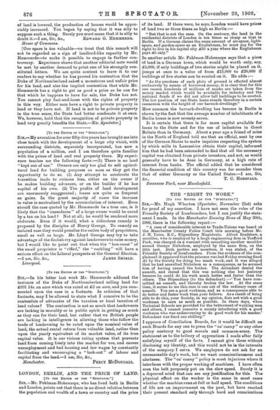LONDON, BERLIN, AND THE PRICE OF LAND. [To THE EDITOR
OP THE SPECTATOR. ] SIR, —Mr. Pohlman-Hohenaspe, who has lived both in Berlin and London, points out that there is no direct relation between the population and wealth of a town or country and the price
of its land. If there were, be says, London would have prices of land two or three times as high as Berlin:—
" But that is not the case. On the contrary, the land in the residential districts of London is ten times as cheap as that in Berlin. If a German claims the same amount of air-space, light- space, and garden-space as an Englishman, he must pay for the right to live in his capital city 450 a year where the Englishman pays £5 only."
In another article Mr. Pohlman-Hohenaspe says that a piece
of land in a German town, which would be worth only, say, £5,000, if only buildings of two stories might be placed on it, jumps at once to a value of from £15,000 to £20,000 if buildings of five stories can be erected on it. He adds :—
" As the purchase of such plots of ground is effected almost exclusively by means of borrowed money, it is clear that for this one reason hundreds of millions of marks are taken from the money market which Would be available for industry and the national funds if we did not allow tall buildings to be erected. The low position of our State loans stands therefore in a certain connexion with the height of our barrack-dwellings."
How common the barrack-dwelling has become in Berlin is shown by the fact that the average number of inhabitants of a Berlin house is now seventy-seven.
It is certain that there is far more capital available for loans to the State and for the use of industries in Great Britain than in Germany. About a year ago a friend of mine in the North of England told me that an official, sent by one of the German States to make inquiries respecting the system by which mills in Lancashire obtain their capital, informed him that he had been astounded to find that all the necessary capital was obtained from private investors, and not, as would generally have to be done in Germany, at a high rate of interest from banks. The official added that he considered the financial condition of this country was far sounder than that of either Germany or the United States.—I am, Sir, Swanscoe Park, near Macclesfield.


















































 Previous page
Previous page